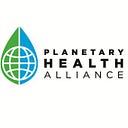Esther Omosa Spotlights Margot Parkes
By Esther Omosa, Travel Scholar and Speaker Ambassador at the 2019 Planetary Health Annual Meeting
Margot Parkes is a Research Chair in Health, Ecosystems and Society at the University of Northern British Columbia, Canada. Her work involves enhancing the understanding of land, water and living systems (ecosystems) as foundational for health and wellbeing through collaboration — across sectors, disciplines and cultural contexts. Her research orientation originated during training and work as a medical doctor in New Zealand and subsequently in public health, human ecology, and now planetary health. Margot’s research connects social and ecological determinants of health, especially in rural, remote, and Indigenous communities, spanning New Zealand, Oceania, Europe, and the Americas. Her research and collaborations continue to be informed by Indigenous knowledge and leadership across Oceania and the Americas, as well as next-generation approaches to learning and collaboration that address complex health and sustainability concerns.
Her ongoing commitment to developing and expanding the emerging field of planetary health is reflected in her involvement as founding board member and past President of the International Association for Ecology & Health, as a co-founder of the Canadian Community of Practice in Ecosystem Approaches to Health (CoPEH-Canada), and as founding Managing Editor (2003–2007) of the international peer-reviewed journal EcoHealth, published by Springer.
During the 2019 Planetary Health Annual Meeting’s session, “Communities, Justice, and Living Systems: Connections for a Healthy and Thriving Future,” Margot facilitated talks aimed at understanding the connections between communities, justice, and living systems for a healthy and thriving future. A medical doctor by training, Margot appreciates moving from just the personal ecosystem, to communities, and now to water bodies, where the winged, finned, and legged species are an important piece in the work she does. The interconnectedness of land-water-health and communities as living systems formed the basis of the discussions — with water including rivers, lakes, oceans; land including mountains; and communities including Indigenous peoples and associated Indigenous knowledge.
The session highlighted case studies on the connectedness of the living system; Rachel Devi presented on Fiji’s watershed interventions for health project. She attested that water is life and that without water, communities are vulnerable. Water-related risks like floods, coupled with poor land and waste management practices, negatively affect the lives of communities.
On another hand, Emmanuela Shinta of the Dayak Tribe in Indonesia asserted that forests are the identity of the communities: without the forests, communities are exposed. Forest fires and logging to clear more land for other activities are some of the threats faced by the communities. Emmanuela is working with the youth to change the rhetoric — as agents of change, youth are using media, specifically local radio, as an avenue to say what needs to be done to protect the forests.
From South Africa, Moses Chimbari presented about the Inguavuma community, which relies on cattle, goats, and small gardens for their livelihood. An invasive weed species (Parthenium hystero) is affecting human health and tourism, and exacerbating wildlife-human conflict was a threat to the environment, humans, and animals. To tackle the challenges, a varied team of different expertise was needed.
Sandy Naranjo of Mothers Out Front-Climate Justice, USA shared how mothers in San Diego have advocated for open space and developed an herb garden to help address the asthma that was affecting children significantly at that time. These efforts enabled them have a connection to open space and culture.
A key takeaway from the session was recognizing citizen science as an important aspect to factor within planetary health work. “Let us develop protocols that resonate with community interest and not what scientist/researcher think is important,” Margot emphasized. Let the community be the lead — they are the source of knowledge, they are not the weak and hopeless, and we need to include them as core, but not as the subject. Establishing Community advisory boards/structures from the local communities and using local enumerators instead of ‘importing’ enumerators from outside the community are some of the ways of engaging the community in research. Ownership and dialogue with communities empowers them and the self-discovering makes them feel part of the research. Besides, giving the research back to the community empowers them and enables them to understand why certain decisions have to be taken.
Finally, connectedness is not a new idea — these are old ideas and they have been in existence for a long time. When we start viewing the work we do as a system and not as isolated parts, we truly will be addressing planetary health.
Margot is helping to organize a meeting on Ecohealth in June 2020 in Durban-South Africa. Read more about the conference here.
Disclaimer: The views and opinions expressed in this article are those of the author and do not necessarily reflect the position of the Planetary Health Alliance or its members.
